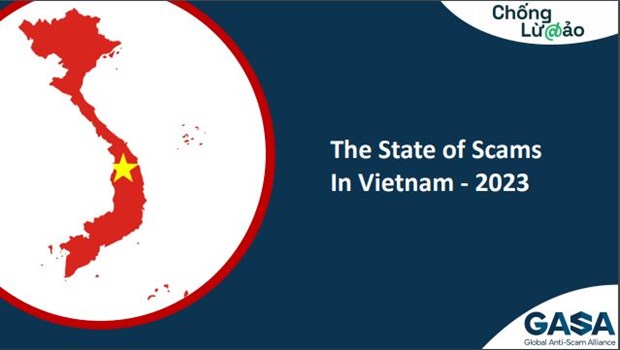Vietnamese loss 16.23 billion USD to online scams
 The report “The State of Scams in Vietnam” by the Global Anti-Scam Alliance (GASA)
The report “The State of Scams in Vietnam” by the Global Anti-Scam Alliance (GASA)Hanoi (VNA) - With the help of technology, scammers tricked Vietnamese out of an average 391.8 trillion VND (16.23 billion USD), or 3.6% of the nation’s GDP in 2023, according to the report “The State of Scams in Vietnam” by the Global Anti-Scam Alliance (GASA).
Drawing insights form an extensive survey involving 1,063 Vietnamese participants, the report provided a comprehensive view of the complex network of scams affecting individuals across the country.
An impactful 55% of Vietnamese respondents expressed confidence in their ability to recognize scams, while a modest 14% admit to lacking confidence entirely. Vietnamese citizens found themselves grappling with scams at an alarming frequency, as a staggering 70% reported encountering scams at least once a month.
The gravity of the situation was underscored by the distressing statistic that 49% have experienced an increase in scams in the year, emphasising the pervasive and evolving nature of this issue.
Unsurprisingly, Facebook and Gmail emerged as the primary conduits for scams, with a substantial 71% of respondents encountering scams through these widely-used platforms. Following closely, Telegram (28%), Google (13%), and TikTok (13%) take the 3rd to 5th positions as the most exploited channels.
Investment scams were revealed as the most prevalent, reported by 13% of respondents. Paradoxically, amidst the prevalence of scams, a significant 56% claim none occurred in the last 12 months, reporting an average of 0.8 scams per participant.
The impact of scams resonates deeply, particularly with identity theft (21%) and shopping scams (21%), leaving indelible imprints on victims. Heart-wrenching narratives vividly detail not only financial losses but also emotional distress, with some victims grappling with thoughts of suicide. The financial toll exacted by scams is substantial, with 29% of participants reporting monetary losses, averaging 17.7 million VND per victim.
According to GASA Director Joriji Abraham, recovery efforts proved to be an uphill battle, with a mere 1% of participants successfully regaining all lost funds and 54% experiencing a strong emotional impact.
He said 22% of the respondents succumbed to attractive offers while others are ensnared by uncertainties or impulsive actions.
Alarmingly, a significant 66% opted not to report the scams to law enforcement, citing barriers such as uncertainty, complex reporting processes and a perceived lack of importance, he added.
Experts from the GASA said that in order to prevent scams, it is necessary to make vigilant checks of contact phone numbers and seek advice from anti-fraud groups on Facebook.
They said heightened awareness, improved digital literacy and streamlined reporting mechanisms are essential to navigate the challenges presented by an ever-evolving digital era.
The resilience and strength of the Vietnamese people play a pivotal role in adapting strategies to safeguard against scams and contribute to building a safer digital environment for all.
According to the Authority of Information Security under the Ministry of Information and Communications, during January – November, it received more than 15,900 scam complaints, 91% of which related to banking-finance frauds and forgeries.
Anonymous SIM cards, unauthorised bank accounts, private data leaks together with the boom of new technologies like DeepFake led to an array of online scams in 2023. There are 24 types of scams prevalent in Vietnam, including brand impersonation, account hacks and other combinations./.













